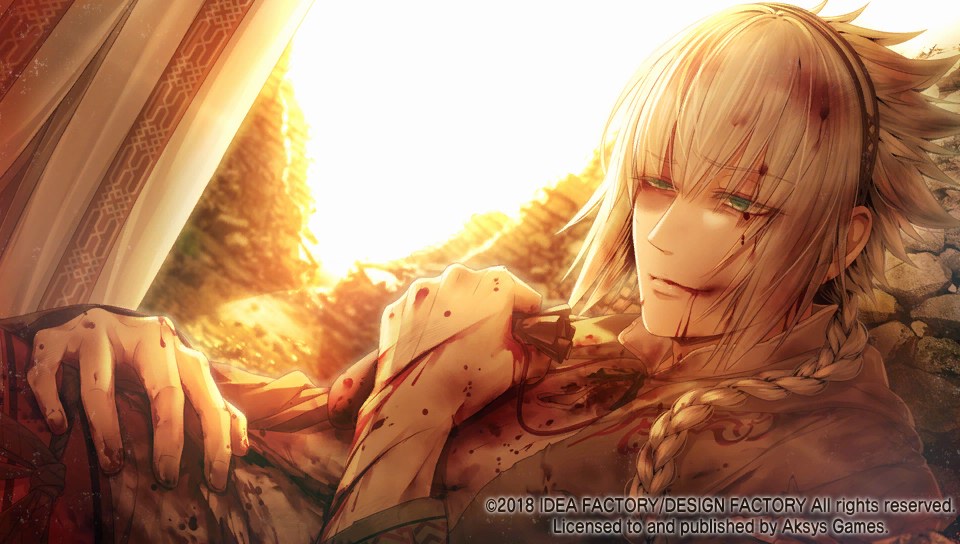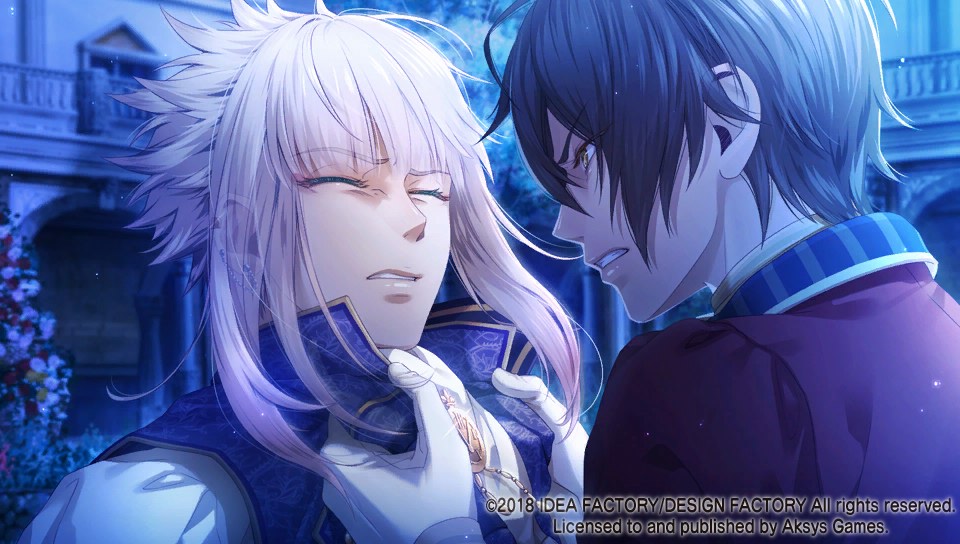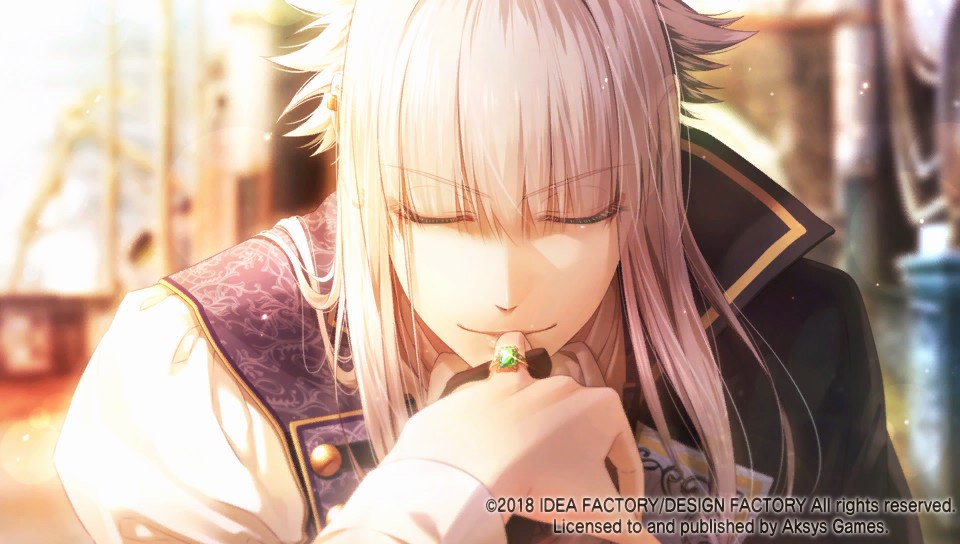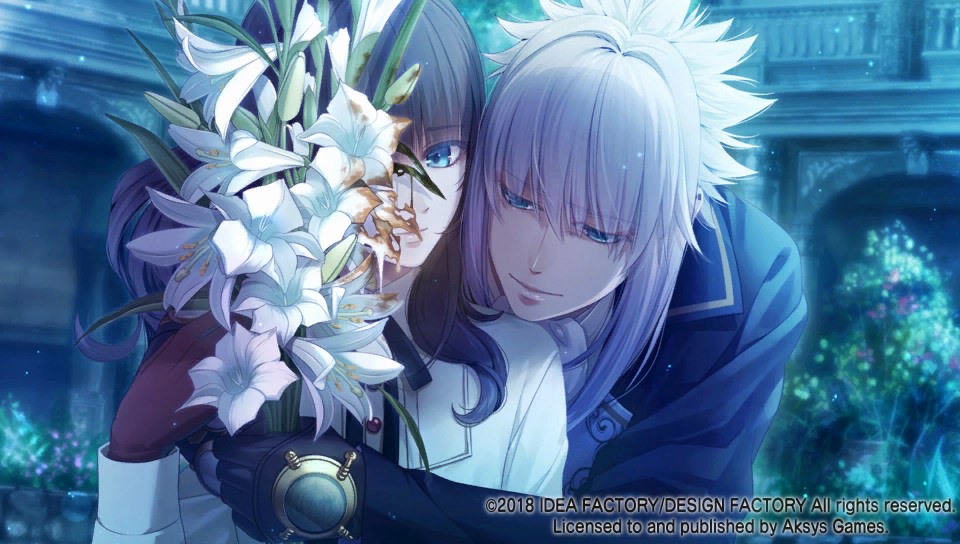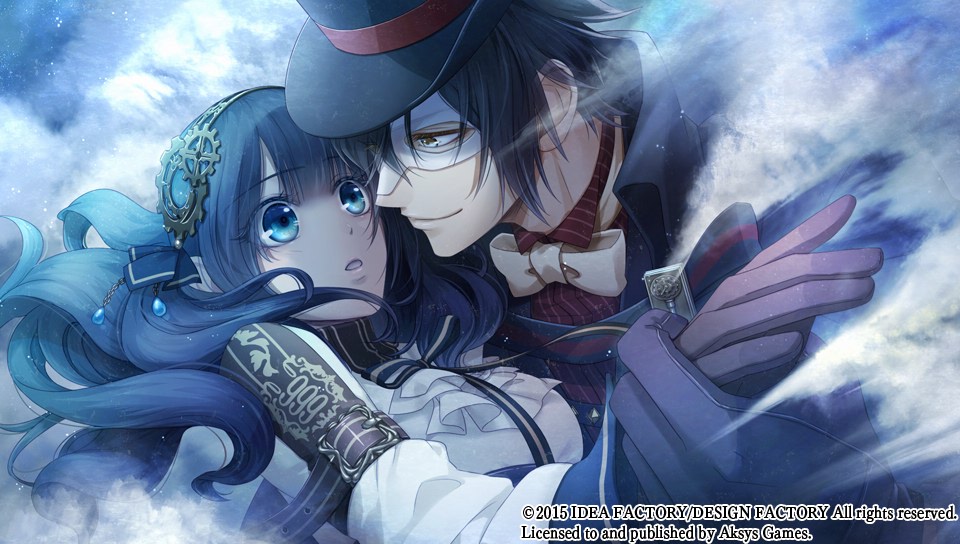First Impression: HELL YEAH! WE’RE GETTING HIS BACKSTORY!!!!!
It wouldn’t be Saint-Germain’s route if there weren’t at least some angst involved. The story continues their journey of searching for a cure for the Horologium’s poison. Their latest stop is France, where they go to Paris in hopes of obtaining some documents from a lab of the legendary alchemist Hermes Trismegistus.
Unlike the other After Stories, Saint-Germain’s starts off with the piece of the past we were given a glimpse of in the main game, but never the full picture of the interaction, nor knew anything about Saint-Germain’s origins. Right from the get go, we learn he was a born a slave, and knew nothing of freedom or choice. He and other slaves were building a tower for a King when an Apostle of Idea attacked them, and destroyed it. At the verge of death, the Apostle gave him an opportunity to join Idea, and be granted immortality. As he was the one who saved Saint-Germain, he was also the one who named him.

The man was Trismegistus. He was not your typical Apostle. He was a free spirit and would travel around the world on the whim, he didn’t like the way they did things, and ignored Omnibus’ summons countless times. In fact he would shove his responsibilities onto Saint-Germain while he ran off and did his own thing. Although Saint-Germain never said it out loud, they were good friends. And tragically, Saint-Germain was also the one who was responsible for is death.
The circumstance behind that is actually quite bittersweet. Trismegistus deliberately began research on the taboo subject of the Philosopher Stone, and even though Saint-Germain had warned him not to do it because of the consequences that would follow, he did it anyways. He did it because he knew it would be the most efficient way to finally be put to rest (since he was tired of being immortal), and because he was doing it because of a certain promise he made with someone. He was eventually killed by Saint-Germain, who didn’t want to kill him, and even begged for him to run away, but ended up following through with his wish because Trismegistus would rather die by his hands than someone else’s’.
 This is why Saint-Germain brought Cardia to Trismegistus’s lab in hopes to find the Emerald Tablet, only to find it was looted. Hilariously, we later learn the one behind that was none other than Lupin himself. Oh man, when Lupin started acting all fidgety when they sought his help to trace it down, I knew it would be him. It was hysterical when he pleaded guilty! Thank god it was him though, because I wasn’t sure if they were really going to be able to trace it down. I always imagined Cardia’s poison would be resolved as it had in Victor’s.
This is why Saint-Germain brought Cardia to Trismegistus’s lab in hopes to find the Emerald Tablet, only to find it was looted. Hilariously, we later learn the one behind that was none other than Lupin himself. Oh man, when Lupin started acting all fidgety when they sought his help to trace it down, I knew it would be him. It was hysterical when he pleaded guilty! Thank god it was him though, because I wasn’t sure if they were really going to be able to trace it down. I always imagined Cardia’s poison would be resolved as it had in Victor’s.
But I actually liked they changed it up a bit. The resolution to Cardia’s poison was a lot more sentimental and symbolic, making it so this Emerald Tablet was more than just a cure, it was also the miracle they needed, with Trismegistus fulfilling Saint-Germain’s wish to attain ‘Ordinary Happiness’ he had made when he agreed to become an apostle. If that wasn’t enough, there was even a message for him at the bottom, where Trismegistus wrote Saint-Germain’s wish will eventually come true.
And the use of the Emerald Tablet kept getting better when Saint-Germain becomes inspired to use Emerald (that can help absorbs the Hologium’s toxins) for their engagement wedding ring when he finally proposes to her.

I don’t know about you, but I loved the proposal, I loved how he decided to do it on Tower Bridge where they fought and won against Omnibus. But most of all, I really appreciate the fact he apologized for doubting her love. It was something that needed to be said before he proposed to her, so I’m glad they included it.
As for the angst part of the story, oh my poor heart.

It hurts like a bitch to see Saint-Germain feel insecure about their relationship. He is so aware how much everyone else loves her, that he was scared he wouldn’t be enough for her. This “privilege” became a toxic sense of security, where there was a part of him believed as long as he is the only one who has the ability to touch her, she won’t leave him, which is how the twisted selfishness was born. And when he realized it, Saint-Germain was so disgusted with himself, he felt guilty for thinking and saying such stupid things.

That’s why I am glad Lupin was there. Saint-Germain needed someone to help him confront his fears and express how he truly feels. And seriously, I’m glad somebody heard what he said, because while he acknowledged how stupid it was for him to say such a thing, it makes it more effective to have someone like Lupin reinforce it.
But frankly speaking, while Saint-Germain may have still required someone like Lupin to force his hand, I still wished Cardia had done more on her end. There were a number of times when she considered bluntly asking him why he had been asking so strange for past few days, only to chicken out. And then when Saint-Germain was expressing his uncertainty about what would she do if they couldn’t find a cure, instead of asking him what’s wrong and why he was asking such question, and why he was acting this way, she answered his question. It would have been nice for Cardia to explain how loved him for who he is, without needing a middleman to set the table for her. It’s just these little details that kind of frustrated me, since it could have offered a different dynamic.
Then again, these two weren’t exactly the greatest communicators to begin with…
But you get my point.
Final Verdict: 4/5
Although I have some disagreements with how some things were done, I still felt this was one of the most interesting and engaging stories of Future Blessings. It had an excellent mix of angst, dabbles of fluff and featured Saint-Germain’s backstory tracing back to his origins of how he became an Apostle in the first place. I absolutely loved how they made use of an existing conflict, by carrying over and addressed it so it could be properly resolved. Sure, I felt they could have approached it a bit differently by empowering Cardia to confront Saint-Germain herself instead of asking Lupin to do it, but otherwise I still enjoyed every second of it— even when my heart was in a twist because of Saint-Germain’s insecurities, and how ashamed and guilty he was about feeling the way he did.
But that isn’t to say it didn’t leave more to be desired (especially in the kisses department. The first one doesn’t count because we didn’t see it). However I especially adored the ending, the proposal, the use of the ring, and the slightly different approach to how Cardia was healed, since the Emerald played a big part of that, in a beautiful way. Now I am actually happy I put this off for so long, because now I’m hungry for more and hopefully we will actually get some fluff in Wintertide Miracles.
Read more Saint-Germain Reviews
➛ Read Code: Realize ~ Guardian of Rebirth: Saint-Germain Review
➛ Read Code: Realize ~ Wintertide Miracles: Saint-Germain Review
More Code:Realize ~Future Blessings~ Reviews
➛ Code:Realize ~Future Blessings~ Abraham Van Helsing Review
➛ Code:Realize ~Future Blessings~ Impey Barbicane Review
➛ Code: Realize ~Future Blessings~ Victor Frankenstein Review
➛ Code: Realize ~Future Blessings~ Arsène Lupin Review
➛ Code: Realize ~Future Blessings~ Another Story: Lupin’s Gang
➛ Code: Realize ~Future Blessings~ Extra Story: Herlock Sholmes
➛ Code: Realize ~Future Blessings~ Extra Story: Finis
